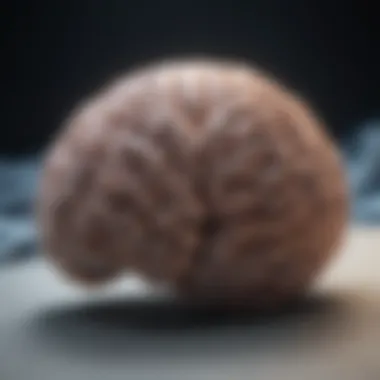Deep Sleep and Its Impact on Depression Explained


Intro
The interplay between deep sleep and depression is a complex web that demands our attention. Sleep, particularly the deep stages of it, isn’t just a time for our bodies to rest. It plays a critical role in regulating mood and overall mental health. Experts suggest that a good night’s deep sleep can sometimes be the balm for emotional distress, while disruptions in this vital phase can amplify feelings of despair and hopelessness. This article aims to unravel this intricate relationship by highlighting key findings from recent research, examining historical contexts, and discussing modern trends within this fascinating field.
Prolusion to Sleep and Mental Health
The connection between sleep and mental health is like the thread in a tapestry—when it frays, the whole structure can fall apart. Understanding this relationship is especially important as we delve into how deep sleep and depression affect each other.
Sleep is a fundamental aspect of our well-being. It’s not just about resting our bodies but also about restoring our minds. There are many layers to sleep, particularly deep sleep, which is the part that seems to rejuvenate us most profoundly. In fact, research suggests that without proper deep sleep, our emotional regulation and cognitive functions can wane. Poor sleep can create a vicious cycle where it exacerbates existing mental health issues.
Understanding Deep Sleep
Deep sleep, often referred to as slow-wave sleep, is crucial for several physiological processes. During this restorative stage, our body undergoes vital repair work; growth hormones are released, and memory consolidation takes place. It’s the time when the brain clears out toxins accumulated during the day. While sleep is generally categorized into distinct stages, deep sleep is where the body and mind synchronize, fostering resilience against stress and emotional upheaval.
For individuals grappling with depression, the interruption or lack of deep sleep can pose serious challenges. Individuals often report feeling significantly worse after a night of poor sleep. This brings us to another pertinent point: deep sleep does not only act as a buffer against depressive symptoms; rather, it plays an active role in maintaining emotional equilibrium.
Overview of Depression
Depression is not merely a mood disorder—it’s a complex ailment that affects the entire spectrum of a person’s life. Symptoms can range from persistent sadness to an overwhelming sense of hopelessness; there can be changes in appetite, sleep disturbances, and a lack of interest in activities once deemed enjoyable.
Current statistics reveal that depression impacts an estimated 264 million people worldwide. While it can manifest due to various reasons—be it genetic predisposition, environmental triggers, or lifestyle factors—its relationship with sleep is particularly striking. Many individuals with depression report experiencing sleep difficulties, including insomnia or hypersomnia. This suggests a complicated, intertwined relationship where sleep and depressive symptoms exchange roles, each exacerbating the other.
"Sleep is the golden chain that ties health and our bodies together." — Thomas Dekker
In exploring the nuances of deep sleep and depression, it's crucial to not only recognize their interplay but also seek a comprehensive understanding. This dialogue concerning sleep and mental wellness will set the foundation for subsequent sections, helping us unpack how these two phenomena can influence each other in unexpected ways. Understanding sleep health as a vital component of managing depression can steer treatments and interventions in a positive direction, paving the way for holistic recovery.
The Physiology of Sleep
The study of sleep physiology serves as a cornerstone in comprehending the intricate bond between sleep and mental health, particularly when it comes to deep sleep and its relationship to depression. Understanding how the body regulates sleep provides invaluable insights into why disturbances in this process can have such profound effects on mood and overall psychological well-being. Sleep isn't merely a state of rest; it's a dynamic process involving various stages that our bodies cycle through multiple times each night. Each of these stages plays a specific role in maintaining bodily functions, processing memories, and regulating emotions, all of which are crucial when addressing depressive symptoms.
Sleep Stages Explained
Sleep is not a uniform experience. It can be divided into distinct phases, each characterized by unique brain activity and physiological changes. These stages include:
- NREM Sleep (Non-Rapid Eye Movement) - This is further broken down into three sub-stages:
- REM Sleep (Rapid Eye Movement) - This is the stage where most dreaming occurs. It plays a vital role in emotional regulation and memory consolidation.
- N1: Light sleep, where one drifts in and out.
- N2: Deeper sleep. Heart rate slows, and temperature drops.
- N3: Known as slow-wave sleep or deep sleep; this is the body's most restorative phase.
Each complete cycle of sleep lasts roughly 90 minutes, with an adult typically experiencing four to six cycles per night. As we age, the amount of time spent in deep sleep tends to diminish, which can have long-standing impacts on mental health.
The importance of deep sleep cannot be understated. It is during this stage that the body engages in critical repair processes, hormone release, and brain detoxification. Studies show that disruption in N3 sleep correlates strongly with heightened levels of anxiety and depression, suggesting a link that goes beyond the surface level. Individuals suffering from insomnia or other sleep disorders may find themselves caught in a cyclical pattern; their struggles with sleep exacerbate underlying mental health issues, creating a feedback loop that complicates treatment efforts.
The Role of REM and NREM Sleep
When discussing the physiological aspects of sleep, it’s vital to delve deeper into REM and NREM stages to recognize their respective roles in mental health.
- NREM Sleep primarily contributes to physiological restoration. It's during these stages that important bodily functions, such as muscle repair and immune system strengthening, take place. The N3 stage is particularly significant for individuals battling depression since it aids in energy restoration and emotional balance. Lack of sufficient NREM sleep can lead to heightened irritability and fatigue, both of which may deepen depressive symptoms.
- REM Sleep, on the other hand, serves a different yet complementary function. This stage is essential for cognitive processes like problem-solving and emotional memory processing. Dreaming, a hallmark of REM sleep, allows the mind to process events and emotions from the waking world. Disrupted REM sleep can leave individuals feeling emotionally drained and unable to cope effectively with daily stressors, often exacerbating feelings of hopelessness or sadness prevalent in depressive disorders.
"Sleep is not just about resting the body; it’s integral to mental and emotional health, influencing everything from mood stability to cognitive function."


Connection Between Sleep and Depression
The intricate connection between sleep and depression cannot be overstated. In fact, understanding this relationship forms a crucial part of unraveling the complexities of both mental health and sleep science. When we talk about sleep, we often think of just the number of hours spent in bed, but the quality of that sleep—especially deep sleep—holds the key to our psychological well-being. A restful night’s sleep is like a reset button for the mind, bolstering cognitive function and emotional resilience. Conversely, poor sleep can send depressive symptoms spiraling into a deeper abyss.
Evidence from Sleep Studies
Research highlights a robust correlation between the quality of sleep and the severity of depression. Numerous studies have shown that individuals with depression often report disrupted sleep patterns, including difficulty falling asleep, frequent awakenings, and reduced levels of deep sleep. For instance, a study published in Sleep Medicine Reviews found that those suffering from depression spend less time in slow-wave sleep, the restorative phase critical for mental recovery.
These findings lead to an unsettling question: Is it the depression causing sleep disturbances, or is it inadequate sleep contributing to depressive symptoms? Evidence suggests a two-way street. Where one influences the other, the implications for treatment are substantial. Think of this connection like a game of tug-of-war, with both sides pulling at the rope—strengthening the need for a holistic approach in both sleep therapies and depression treatment strategies.
Neurobiological Links
Delving into the neurobiology, we begin to uncover the mechanisms at play. The brain's architecture is altered in both sleep disorders and depressive states. For instance, neurotransmitters such as serotonin, which play a dual role in regulating mood and sleep, have been found in imbalanced levels in those experiencing either condition.
The hypothesis that sleep disturbances contribute to dysregulation of the hypothalamic-pituitary-adrenal (HPA) axis is particularly interesting. This axis is pivotal in our body's response to stress, and when sleep is compromised, it may trigger an overactive stress response, triggering or exacerbating depressive symptoms. The dance of these neurochemical pathways illustrates the deep entrenchment of sleep in emotional regulation and mental health.
“What we see is the brain and body are not separate entities; rather, they communicate in profound ways that influence our psychological state.”
Psychological Effects of Sleep Deprivation
The psychological toll of sleep deprivation is both demanding and multifaceted. When we rob ourselves of adequate sleep, the result is not just fatigue; it can derail emotional regulation, leading to irritability and mood swings. Daily challenges become mountains to climb, and decision-making, often clouded by emotional turmoil, leads to further distress. Anxiety makes a home in the hollow spaces left behind by a lack of restorative sleep.
In individuals already dealing with depression, sleepless nights may add an extra layer of disorientation and hopelessness. The fatigue compounds their existing feelings of worthlessness or despair, creating a vicious cycle that’s hard to break. Even psychotherapy or behavioral interventions might not yield lasting effects without addressing the underlying sleep issues.
The Bidirectional Relationship
Understanding the bidirectional relationship between deep sleep and depression is critical for grasping the complexities of mental health. This interplay not only helps demystify how both elements impact each other but also paves the way for effective treatment strategies. At its core, this relationship emphasizes that an individual’s mental state can profoundly influence sleep patterns, and vice versa, thus necessitating a comprehensive approach to care that addresses both aspects simultaneously.
As we unravel this intricate connection, it becomes evident that disturbances in sleep can lead to the exacerbation of depressive symptoms, while depression itself often manifests as sleep disturbances. The ramifications of this cycle are wide-reaching. Individuals struggling with depression may find their sleep fragmented, leading to insufficient restorative sleep needed for emotional regulation. Conversely, poor sleep quality can deepen feelings of hopelessness, fatigue, and irritability associated with depression.
How Depression Affects Sleep Patterns
Depression tends to warp the natural rhythm of sleep. Individuals afflicted with depression might experience a range of sleep disorders, including insomnia, hypersomnia, or frequent awakenings. Notably, insomnia is a common complaint among those who suffer from depression, elevating anxiety and making it hard to ease into the restorative stages of sleep. For the individuals, this is akin to fighting an uphill battle: the less they sleep, the worse their mood can become, and the more their sleep deteriorates.
In particular, research suggests that when someone is depressed, their sleep architecture alters. This is characterized by a reduction in the overall time spent in deep sleep. Here are a few key points:
- Delayed Sleep Onset: It's not uncommon for those dealing with depression to struggle in falling asleep, leading to a vicious cycle of sleeplessness.
- Restless Sleep: Even when sleep is achieved, it can be fragmented. The quality of sleep diminishes, disrupting the more profound sleep stages which are essential for recovery and energy replenishment.
- Daytime Fatigue: The lack of restorative sleep can foster a state of constant lethargy, further inciting feelings of worthlessness and exacerbating depressive thoughts during waking hours.
This situation creates a landscape where restful slumber seems like a distant dream, and every sleepless night adds another brick to the wall of despair.
Sleep's Influence on Depressive Disorders
Conversely, the way one sleeps can profoundly shape their mental health trajectory. Quality sleep is a biological cornerstone that supports mood regulation and overall wellbeing. It’s no stretch of the imagination to say that sleep acts as a natural antidepressant for many; sufficient and good quality sleep fosters emotional resilience. When sleep is abundant and restorative, there are notable benefits:
- Emotional Resilience: Good sleep enhances the brain's ability to process emotions effectively and cope with stressors.
- Cognitive Function: Proper sleep aids in sharpened cognitive skills—better memory, decision making, and problem-solving—which can lower the chance of spiral thinking often encountered in depression.
- Mood Enhancement: By improving neurotransmitter function and hormonal balance, quality sleep acts as a buffer against emotional distress.
As the research mounts, it becomes increasingly clear that ignoring the sleep-depression connection in treatment approaches is akin to leaving a puzzle piece out of the picture. Acknowledging and addressing these pathways not only assists in treatment but may also lead to new avenues of research in the mental health field.
This interdependent relationship of sleep and depression underscores a vital takeaway: prioritizing sleep can be an effective strategy in the battle against depression, creating a feedback loop that works in favor of recovery rather than relapse.


Recognizing and understanding the bidirectional nature provides a more holistic perspective that invites a broader approach to intervention and treatment, innovating how we view mental health care as a whole.
Impact of Sleep Hygiene
Sleep hygiene refers to a collection of practices and habits that are essential for promoting quality sleep. This concept stands as a pillar in understanding the interplay between sleep and mental health, particularly concerning depression. As the relevance of sleep to one’s overall well-being gains traction, comprehending how sleep hygiene can be fine-tuned to counteract depressive symptoms becomes ever more crucial.
Defining Sleep Hygiene
At its core, sleep hygiene encompasses a variety of behaviors and environmental factors that contribute to enhanced sleep quality. Notably, it includes maintaining a regular sleep schedule, creating a comfortable sleep environment, and engaging in relaxation techniques before bed.
- Regular Sleep Schedule: Going to sleep and waking up at the same time daily cultivates a strong circadian rhythm, prompting the body to regulate its biological clock. This consistency reduces insomnia and enhances the depth of sleep.
- Comfortable Sleep Environment: Ensuring the bedroom is conducive to sleep—ranging from optimal temperature and reduced noise to a darkened atmosphere—promotes uninterrupted restorative sleep.
- Pre-Sleep Rituals: Activities like reading a book, stretching, or practicing mindfulness can signal to the body that it’s time to wind down, paving the way for a restful night.
Sleep Hygiene's Role in Managing Depression
The relationship between sleep hygiene and depression is a fascinating one, where improvements in sleep practices can lead to significant enhancements in mental health. Poor sleep hygiene can act like a double-edged sword, where difficulties in sleeping can aggravate depressive symptoms, and depression can further deteriorate sleep quality.
The following points elucidate the impact of sleep hygiene on managing depression:
- Reduction of Insomnia Symptoms: By adhering to better sleep practices, individuals often find relief from insomnia, a common companion to depression. Improved sleep quality can lead to a more stable mood, reducing the frequency and intensity of mood swings.
- Enhanced Daytime Functionality: Quality sleep affects cognitive function and emotional regulation. A well-rested individual is generally sharper and more resilient, less prone to fall into the traps of negative thinking characteristic of depression.
- Increased Resilience: Good sleep hygiene can equip individuals with a stronger response to stressors. This resilience diminishes the chances of falling deeper into depressive episodes, fostering a cycle of positivity instead.
"Sleep hygiene is like a toolbox; the more skills you have, the better equipped you are to navigate the stormy seas of mental health."
Therapeutic Approaches
In the study of deep sleep and its correlation with depression, understanding the therapeutic approaches becomes crucial. These methods aim to address the sleep disturbances that often accompany depressive conditions. It's not just about getting more sleep; it's about better sleep that can facilitate improvement in mental health. It is essential to explore various therapies that can help guide individuals towards achieving deeper, more restorative sleep while managing depressive symptoms. Each approach offers unique benefits and considerations that contribute to the overall treatment plan.
Cognitive Behavioral Therapy for Insomnia
Cognitive Behavioral Therapy for Insomnia (CBT-I) emerges as a pivotal tool in the fight against sleep disturbances. CBT-I is tailored to help individuals recognize and change the thoughts and behaviors that contribute to sleeping issues. Unlike medications, which may provide temporary relief, this therapy focuses on long-term solutions. It equips individuals with coping strategies and promotes sleep-friendly habits, ultimately fostering a more favorable sleep environment.
Here are some key components of CBT-I:
- Sleep Restriction: Limiting time in bed to actual sleep time can promote sleep quality.
- Stimulus Control: This encourages establishing a strong connection between the bed and sleep, effectively reshaping patterns leading to insomnia.
- Cognitive Restructuring: Reevaluating negative thoughts surrounding sleep can alleviate anxiety, thus allowing for more restful nights.
Through the use of CBT-I, many individuals have reported not only improvements in sleep but also a reduction in depressive symptoms. This method provides holistic benefits that can serve as a cornerstone for treating depression related to sleep issues.
Pharmacological Interventions
Pharmacological interventions form another crucial aspect of therapeutic strategies for sleep and depression. Various medications can assist in regulating sleep patterns or addressing underlying depressive symptoms. However, these should ideally complement other therapeutic approaches rather than serve as standalone solutions.
Some commonly utilized medications include:
- Antidepressants: Selective Serotonin Reuptake Inhibitors (SSRIs) that can improve mood and may subsequently help with sleep.
- Sleep Aids: Medications like zolpidem, helping initiate sleep, particularly in chronic insomnia cases.
- Melatonin Supplements: These can help realign the body’s natural clock, especially in individuals whose sleep-wake cycles are disrupted.
It’s essential to take a cautious approach when using medications. Balancing their benefits against potential side effects is important. Consulting with healthcare providers remains paramount to develop a tailored medication plan that adequately addresses specific sleep needs and depressive symptoms throughout the treatment process.
Integrative Approaches: Mindfulness and Sleep
The integration of mindfulness techniques into sleep management offers a refreshing perspective on therapy. Mindfulness, when combined with sleep strategies, emphasizes the importance of mental awareness and relaxation techniques. By learning to approach thoughts and feelings without judgment, individuals may find it easier to transition into the restorative stages of sleep.


Considerations for incorporating mindfulness into sleep therapy include:
- Mindfulness Meditation: Regular practice can promote relaxation and reduce anxiety, allowing for smoother sleep onset.
- Breathing Techniques: Controlled breathing can help calm the nervous system, making it easier to drift off at night.
- Body Scanning: This practice encourages awareness of bodily sensations, which can promote relaxation and ease muscle tension.
Integrative approaches like mindfulness not only enhance sleep quality but can also mitigate depressive symptoms. They offer a dual benefit that highlights the necessity of looking beyond conventional therapies.
Ending
Being proactive about sleep hygiene and implementing diverse therapeutic approaches are vital measures in managing the complex intersection of sleep and depression. By exploring traditional and innovative methods, individuals can find personalized solutions that can lead to both improved sleep and enhanced mental well-being.
"In the journey to better mental health, nurturing the quality of sleep must not be an afterthought; it should be a foundational step."
Engaging with these therapeutic strategies can foster a more profound awareness of one's needs and ultimately lead to a more fulfilling life.
Future Directions in Research
As we look toward the horizon of sleep and mental health studies, it’s crucial to understand that the relationship between deep sleep and depression is still an evolving puzzle. Emerging research avenues offer promising leads that could translate into novel treatment approaches and a deeper grasp of the physiological mechanisms at play. By focusing on future directions in research, we can gather insights that not only enhance clinical practices but also empower individuals to take control of their mental health.
Identifying New Biomarkers
Recent advances in neurobiology suggest that identifying new biomarkers related to deep sleep could illuminate the pathways that connect sleep disturbances and depressive symptoms. Biomarkers might include genetic markers, neurotransmitter levels, or even sleep architecture variations. For instance, studies have hinted that alterations in certain brain waves during deep sleep phases might correlate with the severity of depression. This relationship suggests potential future research could:
- Standardize measures in diagnosing sleep-related depression: Better metrics could provide clarity not just about sleep quality, but how it corresponds to suicidal ideation or chronic depressive patterns.
- Enable personalized treatment strategies: Identifying unique biomarkers might allow clinicians to tailor interventions, leading to improved sleep and mood management.
This investigation requires a multidisciplinary approach, incorporating psychology, genetics, and sleep medicine. It’s no small feat, but the potential benefits could revolutionize how clinicians address the intertwined symptoms of insomnia and depressive disorders.
Interventions Tailored to Individual Needs
The complexity of deep sleep and depression signifies that a one-size-fits-all approach is less likely to yield satisfactory results. Future investigations must focus on developing interventions that are tailored to individual needs. This might include personalized cognitive behavioral strategies, medication regimens, and lifestyle modifications that are attuned to specific sleep patterns.
- Customization of Cognitive Behavioral Therapy for Insomnia (CBT-I): Tailoring this approach based on individual sleep diaries and personal histories can lead to more effective treatments.
- Exploration of Alternative Therapies: Techniques such as mindfulness-based stress reduction and neurofeedback could be researched on how they affect sleep cycles differently among individuals with varying types of depression.
By acknowledging that each person's experience of sleep and mental wellness is unique, researchers can pave the way for a more nuanced understanding of therapeutic interventions.
"Understanding the depth of individual experiences will allow for holistic approaches to treatment, ensuring a better quality of life for those affected by depression."
Epilogue
The significance of sleep, especially deep sleep, cannot be overstated when examining mental health issues, notably depression. Throughout this article, we've methodically unraveled the multifaceted relationship between these two elements. Another thing to keep in mind is how critically sleep architecture impacts mental resilience and emotional stability.
Summarizing Key Insights
To recap key findings:
- Deep Sleep's Role: Deep sleep is crucial for physical restoration and emotional regulation. Disruptions in this stage can heighten feelings of sadness and hopelessness.
- Bidirectional Effects: There's a cyclical connection: depression can lead to sleep disturbances, while poor sleep exacerbates depressive symptoms.
- Research Insights: Current studies provide a growing body of evidence that links altered sleep patterns with psychological outcomes, emphasizing the need for tailored interventions.
- Therapeutic Applications: Cognitive behavioral therapy, pharmacological solutions, and integrative practices show potential in addressing sleep issues tied to depression.
This exploration has emphasized that a nuanced understanding of sleep's impact on mental health offers new pathways for treatment. Addressing sleep misalignments might not just unlock more restful nights but also pave the way for improved mental health outcomes.
The Path Forward in Sleep and Mental Health
The future of mental health treatment will likely revolve around a comprehensive approach, incorporating sleep health as a key component. Here are focus areas for further exploration:
- Personalized Treatment Plans: Recognizing that each person's relationship with sleep and mood varies, we need to develop customized interventions that consider individual sleep architecture.
- Integration of Sleep Medicine and Psychology: Bridging the gap between these fields can foster a more holistic approach, ensuring specialists work collaboratively in treating patients holistically.
- Preventive Strategies: Educating communities about the importance of sleep hygiene can empower individuals to take proactive steps to improve their sleep quality, potentially warding off depressive episodes before they begin.
- Continued Research: Ongoing studies must delve deeper into the underlying mechanisms of sleep’s effect on mood, driving innovations in both clinical practices and health education.
In summary, tackling the relationship between deep sleep and depression opens the door to innovative treatment strategies. By understanding and embracing this complex interplay, we stand a better chance of enhancing individual well-being and fostering a society where mental health is prioritized.







